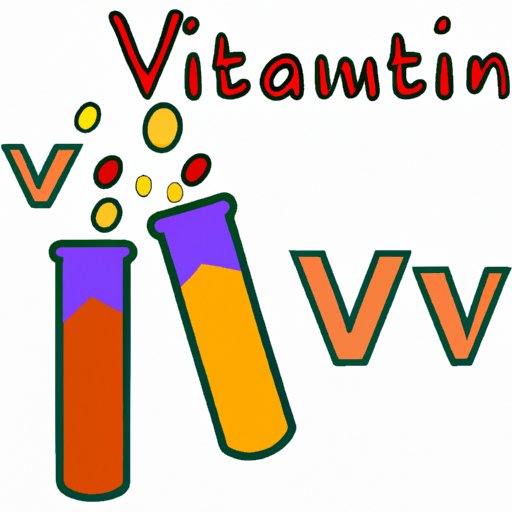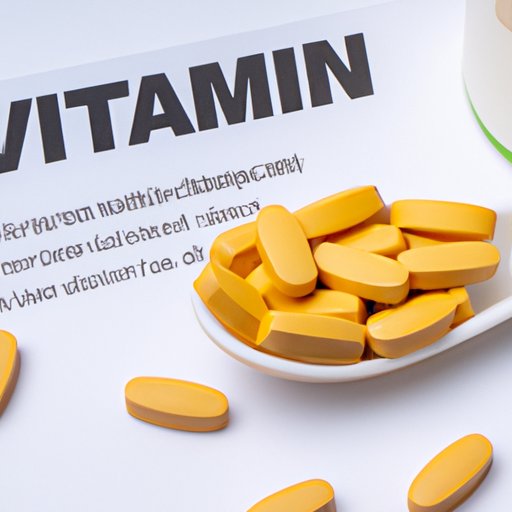I. Introduction
Are you constantly feeling tired and fatigued? Many people experience low energy levels, especially during periods of stress or after prolonged periods of physical activity. The good news is that vitamins can play a major role in combatting low energy levels and keeping you feeling energized throughout the day. In this article, we will explore which vitamins are essential for energy production and how to incorporate them into your diet for maximum benefits.
II. The Importance of Vitamins in Energy Production
Vitamins are essential nutrients that the body needs to perform various functions, including energy production. The body requires several vitamins to create energy, with each vitamin playing a unique role in the process. The B vitamins, in particular, are critical for energy production, along with several other vitamins.
III. Breakdown of Different Vitamins that Help with Energy
Let’s take a closer look at some of the vitamins required for energy production:
Vitamin B1 (Thiamin)
Vitamin B1 plays a critical role in energy metabolism, helping to convert food into energy that the body can use. This vitamin also contributes to the proper functioning of the nervous system and muscles.
Vitamin B2 (Riboflavin)
Vitamin B2 is essential for energy metabolism, helping to convert food into energy that the body can use. This vitamin also plays a role in healthy skin, eyes, and the immune system.
Vitamin B3 (Niacin)
Vitamin B3 helps to release energy from food, contributing to energy metabolism. This vitamin also plays a crucial role in DNA repair and healthy skin and nerves.
Vitamin B5 (Pantothenic Acid)
Vitamin B5 is involved in the production of coenzyme A, which helps convert carbohydrates, fats, and proteins into energy. This vitamin is also essential for healthy skin and the production of hormones and cholesterol.
Vitamin B6 (Pyridoxine)
Vitamin B6 helps to produce neurotransmitters that help regulate mood and energy levels. This vitamin also plays a role in creating red blood cells and maintaining a healthy immune system.

IV. The Science Behind Vitamins and Energy
When the body breaks down food, it is converted into a molecule called ATP (adenosine triphosphate), which the body can use for energy. Vitamins play a critical role in this process, assisting enzymes in the breakdown of food into ATP. Mitochondria, the energy powerhouses of the body’s cells, also rely on vitamins to function.
V. Food Sources Rich in Vitamins that Boost Energy
Many foods are rich in vitamins that help with energy production. Some examples include:
- Whole-grain bread, fortified cereal, and brown rice for Vitamin B1
- Beef, leafy greens, and dairy products for Vitamin B2
- Turkey, fish, and mushrooms for Vitamin B3
- Sweet potatoes, avocados, and lentils for Vitamin B5
- Bananas, nuts, and chicken for Vitamin B6
Consider incorporating these foods into your meals and snacks to boost your energy levels throughout the day.
VI. The Negative Effects of Vitamin Deficiencies
Vitamin deficiencies can have severe impacts on energy levels and overall health. A lack of Vitamin B12, for example, can lead to fatigue, weakness, and even anemia. Other symptoms of vitamin deficiencies can include depression, muscle weakness, and poor immune function.
VII. The Importance of a Balanced Diet in Energy Production
It is crucial to maintain a balanced diet that includes a variety of vitamins to ensure adequate energy production. Consider incorporating more fruits, vegetables, and lean proteins into your meals to boost your vitamin intake. If you are struggling to obtain enough vitamins from your diet, consider taking a multivitamin supplement to fill the gaps.
VIII. Personal Story
I used to suffer from chronic fatigue, which impacted every aspect of my life. After incorporating more Vitamin B12 and other B vitamins into my diet, I noticed a significant increase in my energy levels. Not only did I feel more energized, but I also noticed improvements in my mood and overall mental health.
IX. Conclusion
Vitamins play a critical role in energy production, and a balanced diet that includes a variety of vitamins can help combat low energy levels and fatigue. Consider incorporating more Vitamin B1, B2, B3, B5, and B6 into your diet through whole foods or supplements to maintain optimal energy levels throughout the day. By prioritizing your vitamin intake, you can improve your overall health and wellbeing.
